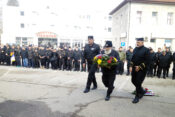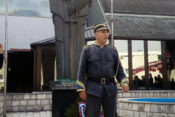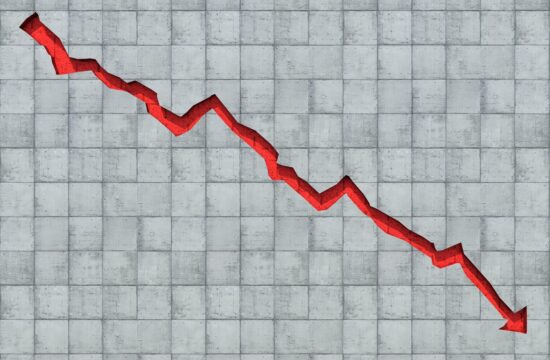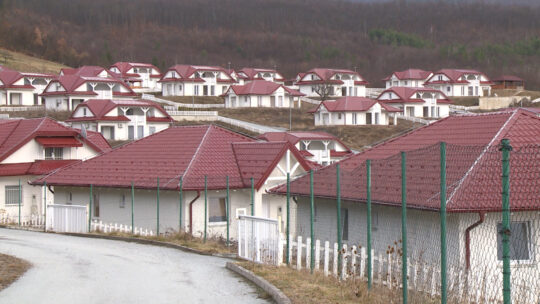
Local and international officials condemned Sunday’s gathering of the Serbian nationalist Chetnik movement in the eastern Bosnian town of Visegrad, where its members and sympathisers have committed war crimes during WWII and the recent Bosnia war.
Dressed in black and wearing Chetnik insignia, some 200 members of the so-called Ravna Gora movement commemorated the day their WWII leader Dragoljub Mihajlovic was caught in 1946 and executed.
They laid flowers in front of a monument dedicated to fallen Serb soldiers from the 1992-95 war.
According to Yugoslav demographers, Chetnik forces killed in WWII at least 33,000 Muslims and 32,000 Croats in one of the most gruesome episodes of Yugoslav history.
During WWII, chetniks slaughtered Muslims from eastern Bosnia and threw them into the river Drina.
During the 1992-95 Bosnian war, Serb nationalists wearing Chetnik insignia expelled 14,000 Muslim residents of Visegrad and killed some 1,700.
The local hotel ‘Vilina Vlas’ was turned into one of the most notorious rape camps where Muslim women were held.
During Sunday’s gathering, the Chetniks sang songs that glorified the atrocities and announced new ones to come.
“Hell will return and the Drina will be bloody again – the Chetniks are coming from the Serbian mountains,” threatened one of the songs that echoed through the Visegrad streets.
The gathering outraged the Muslim Bosniak returnees and survivors of the recent war ordeals in town.
According to the Association of Former Prison Camp Inmates of Bosnia and Herzegovina, “a threat to freedom, life and survival was publically and strongly expressed” on Sunday in Visegrad.
The association also called for institutions to react and ban such gatherings.
“Otherwise, the attendees of yesterday’s gathering will tomorrow begin a bloody crusade from the other side of the Drina river again on Bosnia and Herzegovina, wearing the same uniforms they were wearing when they wreaked havoc during the 1940s and 1990s.
The gathering was also condemned by the Office High Representative (OHR), Bosnia’s top international official who is in charge of overseeing the implemention the 1995 peace agreement, as well as by the British and the US embassies.
“The OHR condemns today’s shameful events in Visegrad,” the High Representative, Austrian diplomat Valentin Inzko, tweeted.
“The competent institutions need to investigate this and conduct fitting activities aimed against those responsible for hate speech,” he wrote, adding that such events “have no place” in Bosnia’s society and that “reconciliation is the only path into the future.”
Local officials also expressed their outrage and called for action.
According to the leader of the Social Democratic Party, Nermin Niksic, “lately we are witnessing another resurrection of political initiatives which imply not only denying, but glorifying war crimes committed in Bosnia and Herzegovina during the 20 century.”
The goal, he said, was the “division of the country into three ethnic entities,” and the creation of an atmosphere of “fear, hatred and divisions.”
“Parts of Bosnia and Herzegovina are, in a political sense, the final bastions of fascism which certain institutions and political parties are openly permitting and advocating,” he concluded.
The Bosniak member of the tripartite Presidency, Sefik Dzaferovic, said that the event was a “dangerous threat to peace and stability” and that it is especially disturbing for the Bosniaks who returned to their homes in what is now the Serb-majority semi-autonomous entity within Bosnia, Republika Srpska (RS).
He called upon institutions to react, most of all the Prosecutor’s Office, the Security Ministry and police agencies, demanding they punish the organisers of the “fascist” gathering, ban similar gatherings across the country, and ban any activities by the Ravna Gora Movement in Bosnia.
He said it was unacceptable that threats with new war crimes and calls for genocide by an organisation that has “historically and legally been confirmed as fascist and responsible for war crimes committed against Bosniaks throughout WWII, but also throughout the aggression on Bosnia between 1992 and 1995” are left unpunished.
“The assembly of the Chetniks within the military formation and threats with ‘hell and a bloody Drina river’, which could be heard, unambiguously represent the crime of inciting national and religious hatred,” Dzaferovic said.
Denis Zvizdic, the head of Bosnia’s government which is called the Council of Ministers, said that the gathering was “anti-civilisational” and that it brings back memories from the 1990s, when the “Chetnik ideology, racism and hegemonism were the basis of the brutal aggression” on Bosnia, which was followed by “a planned and violent exodus and mass war crimes committed against the non-Serb population and which culminated with the (1995) genocide in Srebrenica.”
The gathering is an example of the “deliberate and planned” spreading of nationalist hatred which has the goal of instilling fear in non-Serb returned to the RS, “most of all Bosniaks,” and which is punishable according to the law, he said.
Bosnia has never defined what constitutes a fascist symbol. Each time Chetnik symbols were to be included into the law, Bosnian Serb lawmakers would veto it.







